Key takeaways:
- Mentoring fosters a two-way learning experience, enhancing both the mentor’s and mentee’s self-awareness and personal growth.
- Building rapport through shared vulnerabilities and active listening is crucial for effective mentoring relationships.
- Practical strategies like setting achievable goals and encouraging self-reflection significantly enhance the mentoring process.
- Mentorship transforms challenges into opportunities for connection and growth, benefiting both the mentor and mentee emotionally and intellectually.
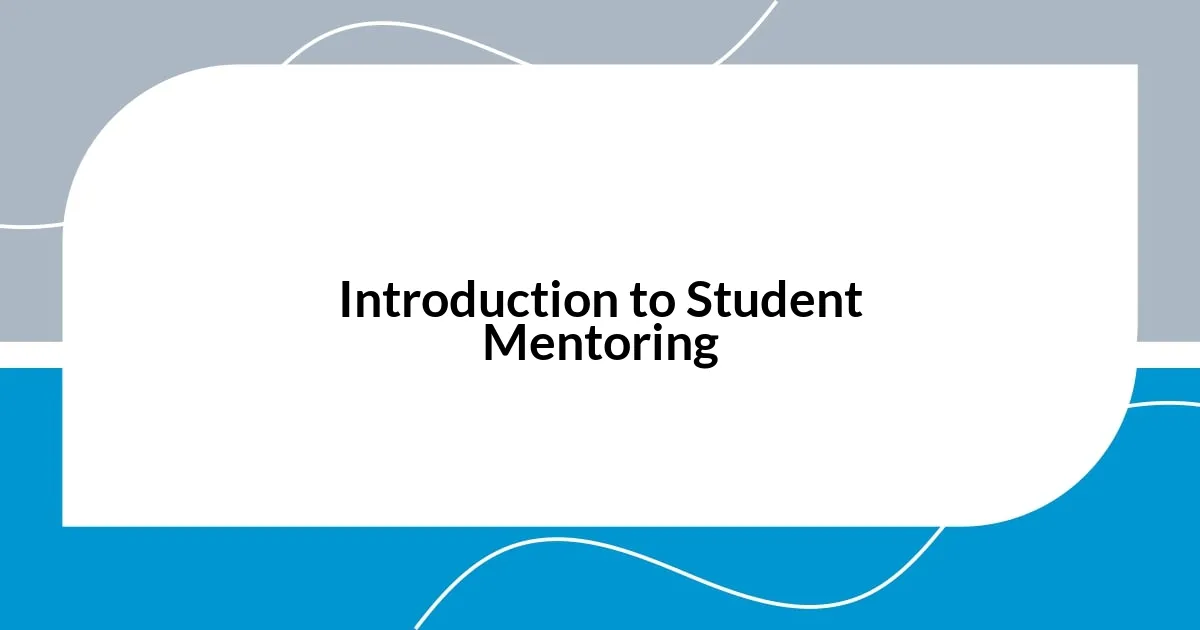
Introduction to Student Mentoring
Student mentoring is a powerful experience that benefits both the mentor and the mentee. I remember my first time mentoring a student who was struggling with confidence. It struck me how our conversations not only helped her voice her concerns but also revealed my own insecurities—this two-way learning was eye-opening.
Have you ever found yourself in a role that challenges you to grow? That’s the essence of mentoring. When I shared my own academic hurdles with my mentee, I realized that vulnerability builds trust. This connection not only inspired her but also sparked deeper reflections on my own journey and successes.
Exploring the dynamics of student mentoring uncovers a wealth of emotional learning. It’s fascinating how one simple conversation can illuminate the path for both the mentor and the mentee. I often ask myself, “What if I hadn’t taken the time to listen?” This realization fuels my passion for mentoring—each dialogue holds the potential to change lives and perspectives.
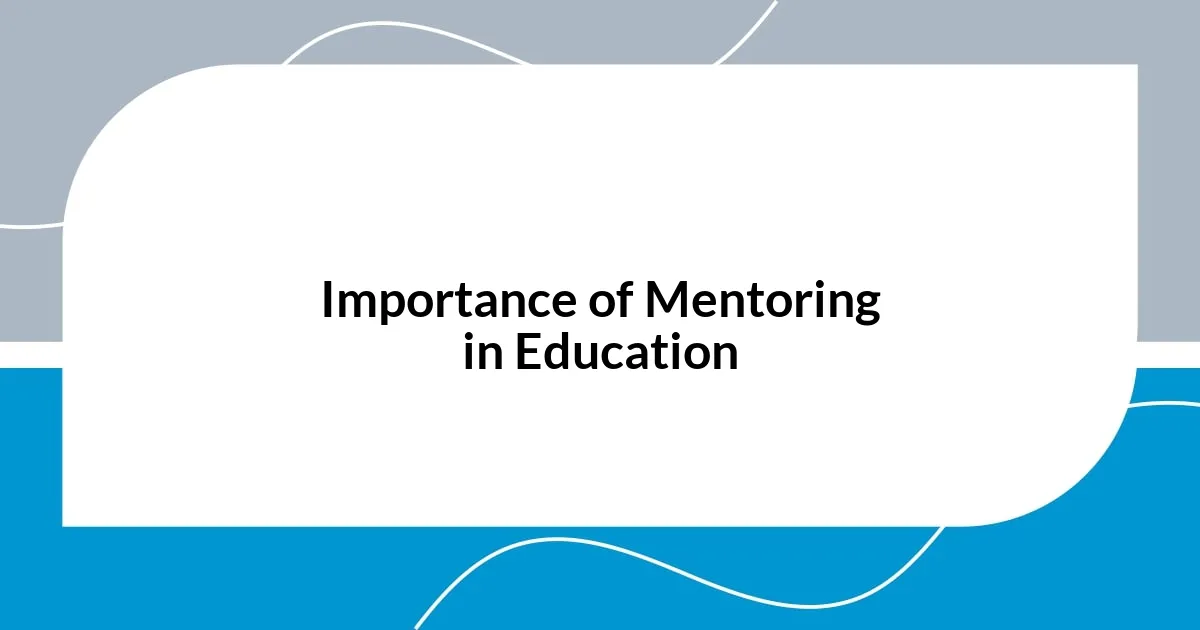
Importance of Mentoring in Education
Mentoring in education is crucial because it creates a supportive environment for learning and growth. I’ve seen firsthand how a mentor can help a student navigate the complexities of academic life, especially during challenging times. One student I mentored shared that our sessions gave him the courage to tackle difficult subjects, something he thought was beyond his capabilities. This transformation not only bolstered his grades but also boosted his self-esteem—a win-win situation.
Here are some key benefits of mentoring in education:
- Individualized Guidance: Mentors provide tailored support based on each student’s unique needs.
- Skill Development: Mentoring helps students develop essential skills like time management and critical thinking.
- Networking Opportunities: Students gain access to professional connections through their mentors, opening doors for future opportunities.
- Emotional Support: The mentor-mentee relationship fosters a safe space for students to express their concerns and worries, enhancing their emotional well-being.
- Increased Retention Rates: Schools with mentoring programs often see higher retention and graduation rates, as students feel more connected and supported.
In my experience, even small gestures—like checking in with a student during a tough week—can make a significant difference. It’s these moments that remind me of the profound impact mentorship can have, not just on academics, but on life as a whole.
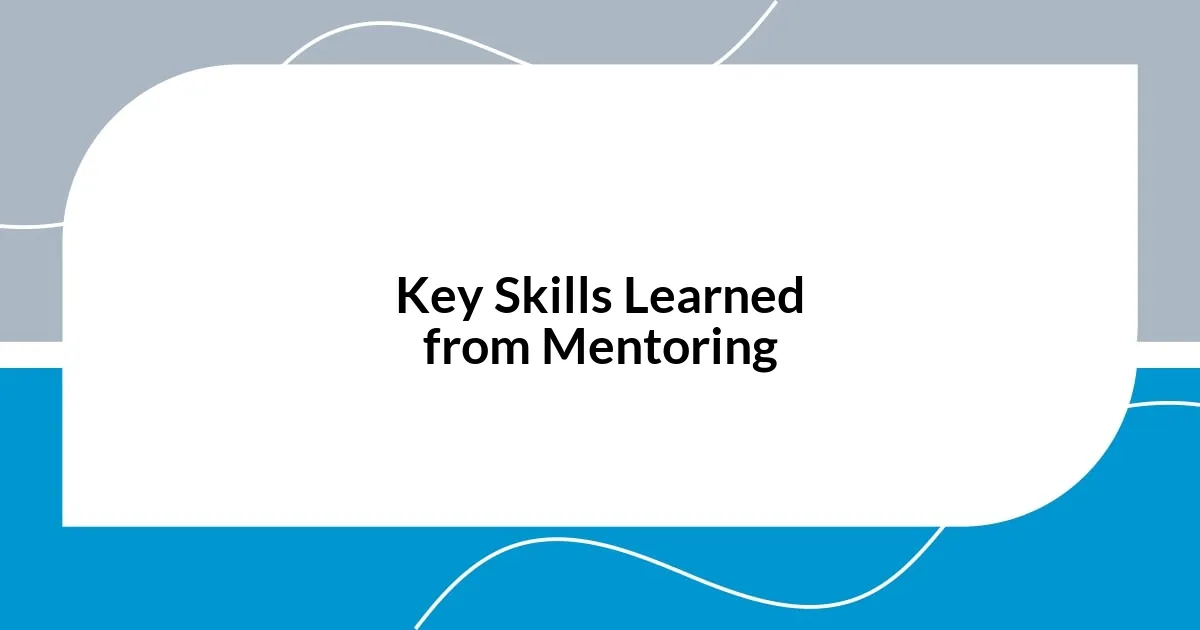
Key Skills Learned from Mentoring
It’s amazing how mentoring sharpens my communication skills. When I mentor students, I have to adapt my language and approach to match their understanding. This experience has taught me the importance of clear and effective communication. It’s not just about speaking; it’s about listening actively to identify their needs and respond thoughtfully. I recall a time when a mentee struggled to articulate their thoughts. By asking guiding questions and offering a safe space, I witnessed her gain clarity and confidence—an inspiring moment that strengthened my ability to communicate.
Through mentoring, I’ve developed strong problem-solving skills. Each interaction presents unique challenges, whether it’s understanding a student’s academic struggles or helping them set realistic goals. For instance, I once helped a student devise a study plan that seemed impossible at first. Together, we broke it down into manageable steps. Watching her tackle those challenges fueled my own problem-solving instincts and reminded me how adaptable we can be when we work together toward a common goal.
Moreover, mentoring has profoundly enhanced my empathy. It’s eye-opening to truly put myself in another person’s shoes. I often find myself reflecting on my own experiences as a student—the fears, the doubts, and the joys. There was a moment when a mentee shared her fear of public speaking—a fear I had faced as well. Sharing my story seemed to ease her anxiety a bit, creating a bond that transcended just mentor and mentee. This connection is something I cherish; it reminds me how vital it is to understand the feelings and perspectives of others.
| Key Skill | Description |
|---|---|
| Communication | Adapting language and approach based on the mentee’s understanding and needs. |
| Problem-Solving | Developing strategies and step-by-step plans to overcome challenges together. |
| Empathy | Building connections by sharing personal experiences and understanding others’ feelings. |
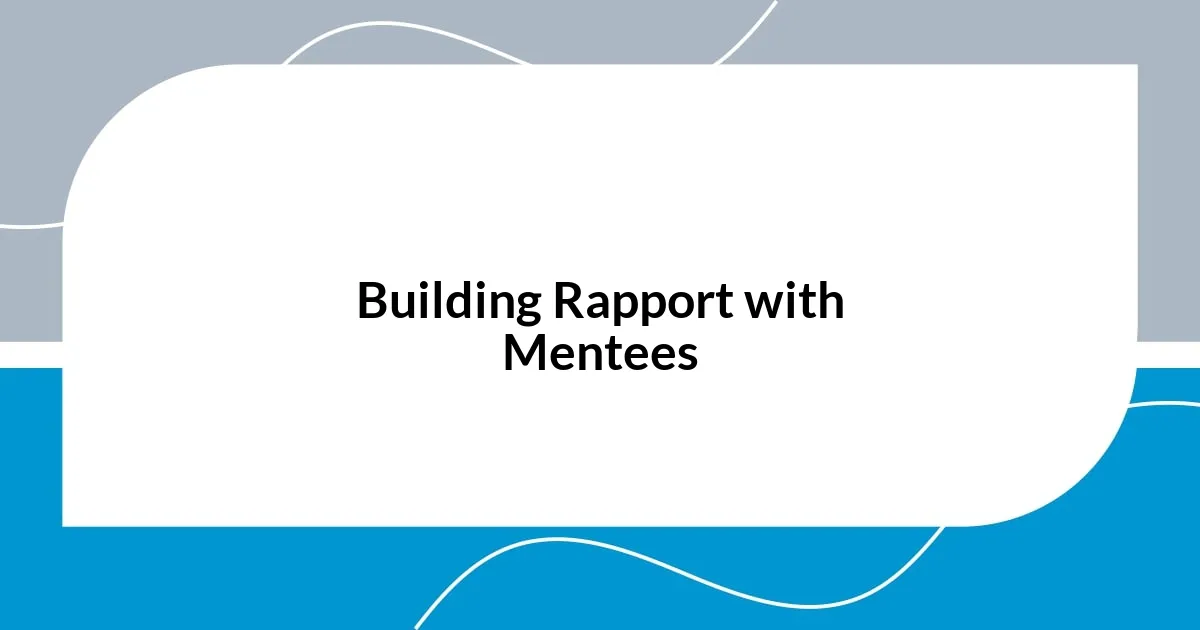
Building Rapport with Mentees
Building rapport with mentees is essential for creating an effective mentoring relationship. I remember one of my first mentees who was shy and hesitant during our initial meetings. It took a few sessions of casual chats about our mutual interests, like hobbies and favorite books, before she opened up. Once that initial barrier was crossed, our conversations became much more engaging and productive. Isn’t it amazing how small talk can lead to deeper connections?
In my experience, establishing trust is key to rapport. I made it a point to share my own academic struggles and failures with my mentees. When they realized I wasn’t just a “perfect” mentor but someone who has faced hurdles too, it changed the dynamic entirely. They began to see me not just as an authority figure but as a supportive ally who truly understood their journey. Have you ever noticed how vulnerability can create a powerful bond?
Empathy plays a significant role as well. There was a time when a mentee expressed frustration over their progress. Instead of offering solutions right away, I listened intently, allowing them to voice their concerns fully. This simple act of being present gave them the space they needed to reflect, and soon enough, they started formulating their own ideas to overcome those challenges. It’s moments like these—where listening goes deeper than advice—that truly solidify rapport, don’t you think?
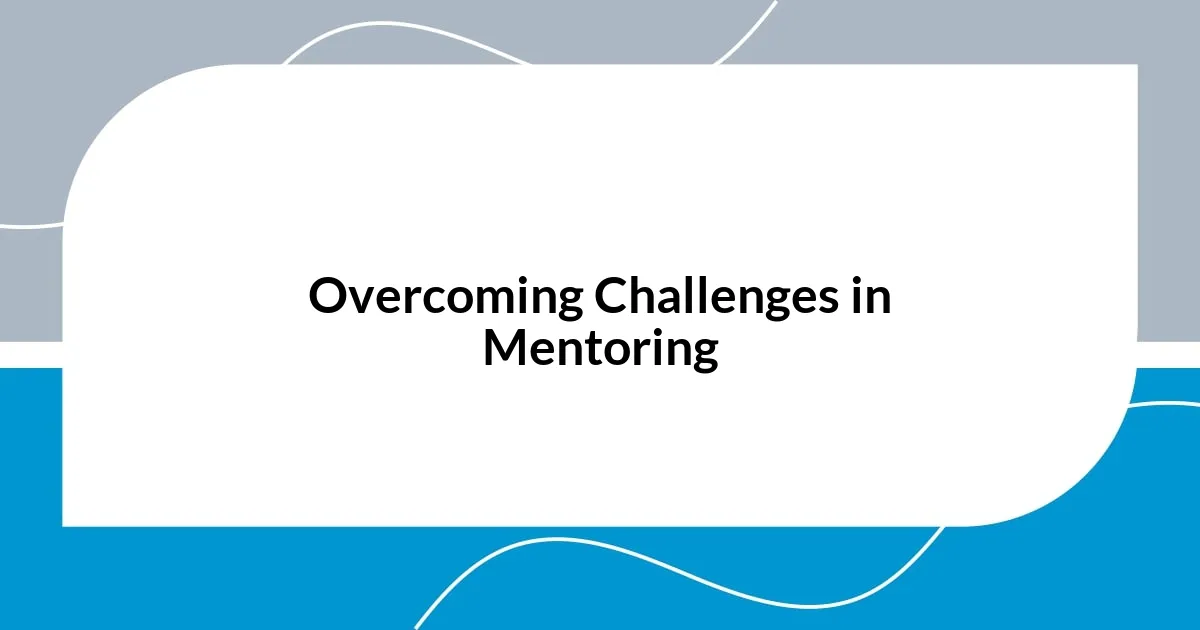
Overcoming Challenges in Mentoring
Overcoming challenges in mentoring often demands patience and creativity. I remember a time when a mentee was struggling with time management, feeling overwhelmed by both academics and extracurricular activities. Instead of lecturing about prioritization, I invited her to co-create a schedule. By involving her in the process, we ended up with a plan that felt achievable—not just a list of tasks, but a personalized roadmap she closely related to.
Sometimes, it’s about navigating emotional barriers too. There was an instance when a mentee seemed distant and unfocused during our sessions. After some probing, I learned she was dealing with personal issues outside of school. Choosing to create a more supportive environment by letting her express her feelings first helped reshape our sessions. Have you ever found that just a little vulnerability can invite someone to open up in ways you never expected?
Ultimately, adapting my mentoring style often leads to breakthroughs. I’ve learned that not every student benefits from the same approach. For a particularly analytical mentee, using logical frameworks worked wonders. But with another who was more hands-on, we made use of project-based learning to explore concepts. I find it fascinating how adjusting my methods—like trying out different keys on a piano—can unlock new potential in each student. Isn’t it incredible how flexibility can transform a challenge into a triumph?
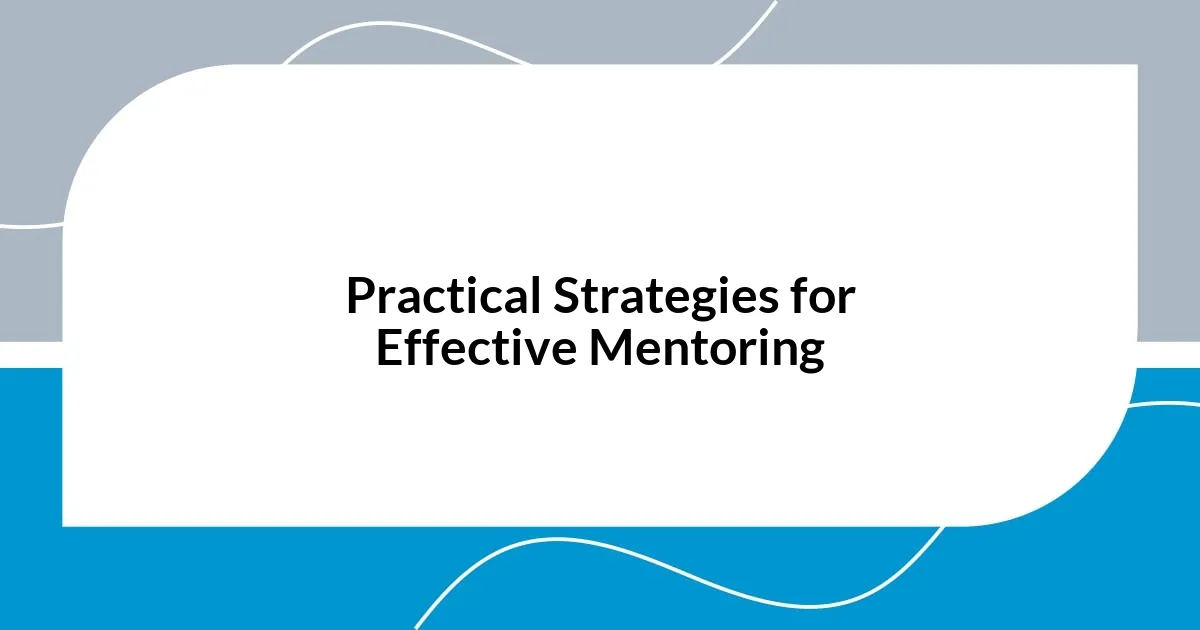
Practical Strategies for Effective Mentoring
One of the most impactful strategies I’ve learned is to set clear, achievable goals together. In one mentoring relationship, my mentee and I identified a specific objective: improving her public speaking skills. We broke it down into smaller milestones, like practicing in front of friends or participating in local events. It was rewarding to watch her confidence grow with each step. Have you ever noticed how accomplishing small milestones can create a sense of momentum?
I also found that encouraging self-reflection can be a game-changer. After a particularly challenging project, I asked a mentee to journal their thoughts about what went well and what didn’t. The process of articulating their experiences not only fostered critical thinking but also empowered them to embrace both successes and setbacks. Reflecting can be therapeutic and educational. Doesn’t it feel great to revisit past experiences with fresh eyes?
Lastly, I think there’s immense value in celebrating achievements, no matter how small. Once, after my mentee successfully delivered a presentation, we took a moment to acknowledge her hard work with a simple applause. This small gesture made her beam with pride and reinforced a positive mentorship dynamic. It’s these little celebrations that keep the motivation alive, wouldn’t you agree?
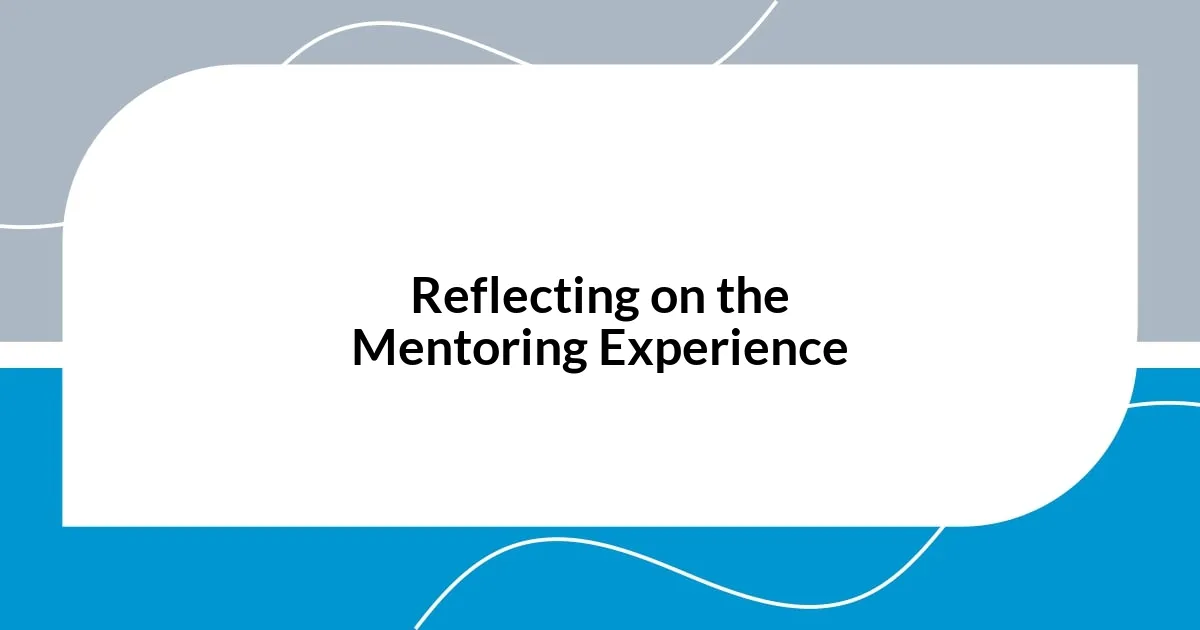
Reflecting on the Mentoring Experience
Reflecting on the mentoring experience brings about a whirlwind of emotions and insights. I recall a moment during a particularly candid session where my mentee shared her fear of failure. Listening to her made me realize how vital it is to create a safe space for such honest conversations. Have you ever felt that rush of connection when vulnerability is shared? It’s in those moments that mentorship transforms from a simple instructional relationship into a profound journey of growth.
Another aspect that stands out to me is how both the mentor and the mentee learn and evolve together. During one engagement, I found myself gaining new perspectives on problem-solving from my mentee’s fresh outlook. I’ve come to appreciate that mentorship is a two-way street; I often leave our sessions with just as much insight as I hope to impart. Isn’t it fascinating how teaching can also be a mirror reflecting our own understanding or biases?
As I look back on these experiences, I can’t help but feel a sense of gratitude for the lessons learned. There were times when the emotional weight of a mentee’s struggles weighed heavily on me, but rather than seeing it as a burden, I viewed it as an opportunity for deeper connection. Each challenge faced together has not only strengthened our bond but also served as a reminder that mentorship encapsulates shared resilience. How often do we overlook the power of empathy in learning? It’s this very essence that makes mentoring so rewarding and transformative for both parties involved.